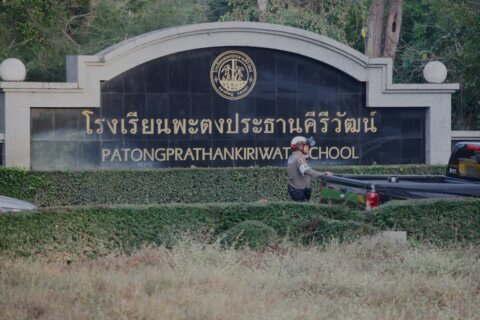This article was republished with permission from WTOP’s news partner InsideNoVa.com. Sign up for InsideNoVa.com’s free email subscription today.
A recent listserv issue at George Mason University exposed emails from students replying to the president’s message on the Israel-Hamas war to the entire university.
The university then removed the emails from everyone’s inboxes, leaving students wondering if their school was trying to silence them.
During a town hall meeting with his employees on Nov. 6, George Mason University President Gregory Washington discussed the university’s achievements since he took office in July 2020.
Days earlier, on Nov. 2, his email outlining a “plan for community safety and well-being” amid the Israel-Hamas war led to frustration among some students, with some hitting “reply all” and inadvertently looping in thousands of recipients who were part of the email listserv.
“Yet, you have failed to address that. You have failed to address the safety and well-being of Muslims and Middle Eastern people on this campus,” Aleyah Razan Moataman Daader wrote in her response on Nov. 3, expressing her disappointment as the university president did not address Islamophobia and its impact on students’ safety.
Following the email backlash, George Mason University, one of the largest public universities in Virginia, removed all student responses without prior notice.
The university in an X post said it was “working to determine how recipients of a university-wide message from the President were able to post responses using institutional listservs.”
“These messages should not have been distributed,” according to the post.
A representative from George Mason University said in an email on Nov. 7 that “several emails intended for a specific individual and not authorized for campus-wide distribution were removed from in-boxes as part of the services shut down to avoid further system errors.”
In another email sent to students and faculty members on Nov. 13, Washington mentioned the incident, saying those emails were removed and the listserv was shut down until the university “could pinpoint the malfunction.”
The university is among many U.S. college campuses finding it challenging to respond to the Israel-Hamas war that has killed thousands of civilians and spurred debates about free speech.
“This is a fraught moment for the world, our country, and our university, with increased acts of violence and hostility toward members of the Jewish, Israeli, Muslim, and Palestinian communities,” Washington said in the Nov. 2 email, adding “hateful expressions against the Jewish community are on the rise right on our own campus.”
He continued, saying, “we repudiate antisemitism just as we repudiated the terrorist attacks on Israel last month” and referring to “the unfolding conflict in Israel and Gaza.”
Washington’s Nov. 2 email angered some students, their responses landed in inboxes university-wide.
“I, amongst other [George Mason] Patriots, have been reading your emails regarding the Israel-Palestinian’ conflict’. As a Mason student and a Muslim minority, I believe there are a few things I would like to respond with,” one student wrote in response to the president’s email before urging him to “make the Muslim and Palestinian communities feel supported.”
Echoing that student’s view, Daader, a junior, wrote she believed in “everyone’s right to safety, health, well-being, and peace” before asking Washington if he would keep “dismissing our pain, fear, and anxiety” in his following email.
Some students were surprised that their university deleted emails in their inboxes. They took screenshots and posted them on Reddit.
“They should fix the listserv issue, but I don’t think they should remove sent emails,” Ha Dao, a senior, said.
Mustafa Kohistani, a student hitting “reply all” to express his concern over antisemitism, also said he saw nothing wrong with some deleted emails.
“I do not see why they should be removed,” Kohistani said, adding he thinks the university can remove emails if they are antisemitic or Islamophobia.
“I strongly feel that Jewish students fear for their safety. And no side should be threatened or silenced as long as they stay within the limits of their freedom of speech,” Kohistani said.
Meanwhile, Daader felt disappointed, saying the university silenced her when removing her email without giving her a reason.
George Mason University on Nov. 1 responded to a video of a woman taking down and tearing up a poster “that appears to depict Israeli children kidnapped as part of the Israel-Hamas conflict,” saying the campus police and University Life personnel will investigate the incident for violating the student code of conduct.
It also sent a message to faculty members, saying the university police would have an “enhanced presence on campus” following an email urging them to join a pro-Palestine protest at its Fairfax campus on Nov. 9.
The U.S. Department of Education has recently issued a reminder to schools, emphasizing their obligation to ensure a discrimination-free environment for all students, including those perceived to be Jewish, Israeli, Muslim, Arab, or Palestinian. This directive follows a series of hate-based or bias-based incidents at educational institutions since the start of the Israel-Hamas war on October 7.






